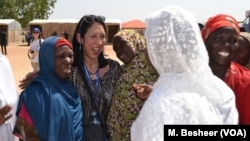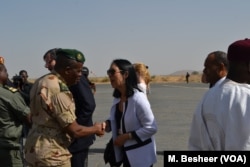The war against Boko Haram is leaving women vulnerable to poverty, violence and isolation, says a U.S. diplomat who visited areas devastated by the Nigerian militant group.
U.S. Deputy Ambassador to the United Nations Michele Sison returned late Tuesday from a five-day U.N. Security Council mission to Nigeria, Cameroon, Chad and Niger. Some 26 million people in the four nations are suffering from the effects of a humanitarian crisis fueled by the terror group’s attacks, including severe food shortages.
In an interview with VOA in Abuja, Sison said women who were formerly involved with Boko Haram — either voluntarily or involuntarily — seem to be stigmatized more than men who fought with the group, especially when it comes to their ability to marry and return to their home communities.
Women face other problems as well. They are often widowed or alone, caring for several children with no way to provide an income for their family.
In Maroua in northern Cameroon and in Maiduguri in northeastern Nigeria, Security Council representatives met with displaced and refugee women.
“In Maiduguri, we were talking about food rations and one of the mothers said ‘Well, I have eight children and these food rations are not stretching far enough to feed all eight children and so I have to go outside of this camp to beg,'" Sison said.
"Now that’s a wake up call for the international community to look at the sustainability of the way that we are funding this rather severe food insufficiency crisis."
Women and girls also have specific protection needs. They are more vulnerable to sexual exploitation and abuse and to early and forced marriage.
“When I asked in the women’s tent, ‘How many of you are the head of the household?,’ almost every hand went up of some two dozen women,” Sison said. The women had either lost their husbands due to violence, had been recruited into Boko Haram, and many had seen one or more children recruited by the Islamist militant group.
“We do see a starkly, more difficult and more challenging picture than we had perceived when we took off from New York last Wednesday,” Sison said.
Senior government officials in all four countries told council members that they have made significant progress in degrading Boko Haram’s military abilities, but that the group still poses a threat because its fighters have switched to more asymmetric tactics, such as suicide bomb attacks.
An integral part of a sustainable peace in post-conflict countries is the Disarmament, Demobilization and Reintegration (DDR) of ex-combatants. Ambassador Sison said during their mission there was a lot of discussion about a new “D” — Deradicalization.
“What we saw, particularly with this increase of the use of women and children as suicide bombers, is that the issues surrounding the examination of root causes, but also of deradicalization, is necessary,” she said.
US support
The United States has a multi-pronged approach to the Lake Chad Basin crisis, extending support in excess of $300 million for 2016-17. That figure includes food aid, basic household items, programs to reach out to youth, and other vital humanitarian assistance.
“On top of that, we have our Global Security Contingency Fund,” Sison said. “Money totaling some $40 million which is devoted to enhance the security cooperation — and particularly border security cooperation — among Cameroon, Niger, Chad and Nigeria.”
The ambassador said when she returns to New York, she and her Security Council colleagues would be “fired up to keep pushing for a scaled-up and sustained response” to the situation.
“I think there are some very unique challenges in this Lake Chad Basin area that are going to continue to put this on the front burner for all of us," she said.





